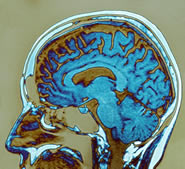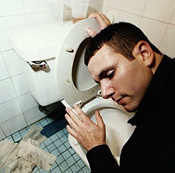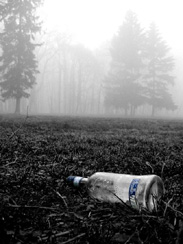How to survive an alcoholic rehab
 This is the best account I’ve ever read of an alcoholic going through rehab and struggling with his subsequent recovery. It’s honest, compelling and darkly humorous.
This is the best account I’ve ever read of an alcoholic going through rehab and struggling with his subsequent recovery. It’s honest, compelling and darkly humorous.
It’s not for the faint hearted though - he graphically details his most debauched binges, his most horrific withdrawals and embarrassing bed-wetting episodes. But he balances this with some wonderfully insightful thoughts about the recovery process, about Alcoholics Anonymous meetings and of course, about his time in a detox and rehab centre.
Augusten Burroughs is a very clever writer, and he engages you from the first page, by the end you feel like you know him inside out. If you’re struggling with alcohol, or you’re thinking about going through rehab, you seriously should read this first.
If you fancy a copy for yourself, here’s the page on Amazon.com where you can get it.


 The charity Turning Point have released a report suggesting that 50% of all alcoholics and drug addicts suffer from mental illness, in the UK at least.
The charity Turning Point have released a report suggesting that 50% of all alcoholics and drug addicts suffer from mental illness, in the UK at least. Everyone knows that alcohol causes harm like brain damage and
Everyone knows that alcohol causes harm like brain damage and  George W. Bush has very compassionately decided to declare that September is National Alcohol and Drug Addiction Recovery Month, 2006.
George W. Bush has very compassionately decided to declare that September is National Alcohol and Drug Addiction Recovery Month, 2006. Because
Because  For those of you who are
For those of you who are  There’s been a few articles around lately in which various people have suggested that Heroin should be made available on the NHS (that’s the free UK health service for non-UK readers). One of these is Dr Richard Simpson, the former Scottish drugs minister,
There’s been a few articles around lately in which various people have suggested that Heroin should be made available on the NHS (that’s the free UK health service for non-UK readers). One of these is Dr Richard Simpson, the former Scottish drugs minister,  Emotional Intelligence is now a fairly popular term, it refers to your ability to understand and deal with your feelings in an adaptive and mature way. When we let our emotions dominate our behaviour without any awareness, it can become a huge problem.
Emotional Intelligence is now a fairly popular term, it refers to your ability to understand and deal with your feelings in an adaptive and mature way. When we let our emotions dominate our behaviour without any awareness, it can become a huge problem. If substances have been used from an early age, then this often becomes the preferred way of coping with difficult feelings. Obviously, we learn most of these skills from our parents, our siblings or our friends as we grow up. So if these people were not themselves dealing with their emotions very effectively, then that is likely to be what we learnt also.
If substances have been used from an early age, then this often becomes the preferred way of coping with difficult feelings. Obviously, we learn most of these skills from our parents, our siblings or our friends as we grow up. So if these people were not themselves dealing with their emotions very effectively, then that is likely to be what we learnt also. This is not limited to alcoholics of course. However, binge drinkers don’t drink every day, and so they may not consider that they have an alcohol problem.
This is not limited to alcoholics of course. However, binge drinkers don’t drink every day, and so they may not consider that they have an alcohol problem. These are often referred to as ‘safe drinking levels’, but of course no level of alcohol consumption is totally risk-free. The levels are officially described as “…the amounts below which it is unlikely that someone will develop significant illness or an early death”. Pretty vague, I’m sure you’ll agree. But it just illustrates that there is no real way to tell exactly how much you can safely drink. The more you drink, the worse the effects, that’s all you need to know.
These are often referred to as ‘safe drinking levels’, but of course no level of alcohol consumption is totally risk-free. The levels are officially described as “…the amounts below which it is unlikely that someone will develop significant illness or an early death”. Pretty vague, I’m sure you’ll agree. But it just illustrates that there is no real way to tell exactly how much you can safely drink. The more you drink, the worse the effects, that’s all you need to know. Many people who are depressed turn towards alcohol to make them feel better, at least temporarily. Conversely, many people who use alcohol in a dependent way tend to become depressed. The classic chicken and egg situation.
Many people who are depressed turn towards alcohol to make them feel better, at least temporarily. Conversely, many people who use alcohol in a dependent way tend to become depressed. The classic chicken and egg situation.